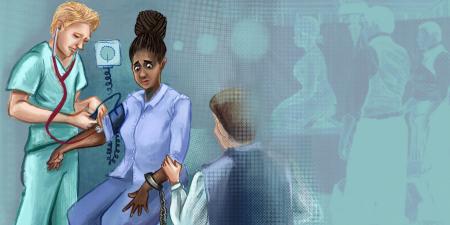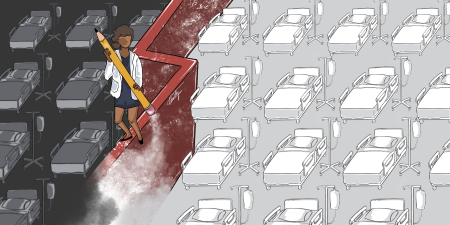Abstract
This comic shares a true story of a physician’s fraught interaction with and examination of a patient and prompts consideration of how context, empathy, and emotional intelligence play key roles in how well patient-physician conversation is likely to go in the moment and when replayed by a patient after an awkward, uncomfortable encounter.
Figure. "What Race Are You?"

Media
Procreate®.
Sometimes a story can be captured in a single image, and this is one such story. So, when a patient seems phenotypically multiracial, we might consider that, clinically and ethically, there’s no reason to ask about race when that patient is in pain and when the clinician’s head and hands are between a patient’s legs.
Physicians aren’t always between our legs, but they can get incredibly personal when gathering information, so when they ask a question and what they ask are important to how comfortable a patient might feel when responding. Questions about one’s relationship or marital status, sexuality, sex-assigned at birth, age, or employment don’t seem necessary from a patient’s perspective and can feel intrusive, interrogative, and like superfluous fodder for unwelcome judgment about matters that aren’t clinically relevant at the moment.
For me, this situation was odd because I identify as mixed-race, so I’m accustomed to people constantly asking about my heritage. But, for some reason, I was caught off-guard when the question, “What race are you?,” emanated from beneath the drape and filled the room. My first thought was “I’m Fuchsia,” which informed me that I immediately felt weird and nervous. My legs were open, naked, and I couldn’t see the physician’s face. I answered with honesty before even questioning why my racial identity would matter, especially right now.
Patients don’t have to be in extremely vulnerable physical positions for a clinician to hold power over their body and safety. Small talk can be helpful in distracting patients from their anxiety and can give well-intentioned, emotionally intelligent clinicians an opportunity to establish their interest, sincerity, competence, and trustworthiness. But a poorly timed question, ill-informed comment, or unnecessary joke is a source of risk that can make an already stressful trip to urgent care even more stressful.
Over the following few days, I wondered whether I should have declined to answer or simply lied. This self-doubt exacerbated the pain of having to replay the whole uncomfortable scenario in my head again. If I had said I was white, would I have gone home with an appropriate, helpful intervention instead of continuing to suffer whatever condition I had that this physician did not properly diagnose? Although clinicians’ personal questions can be relevant to collaboratively resolving a health problem, some questions express bias and social prejudice that can make the clinical encounter itself a source of iatrogenic harm.
If physicians aren’t aware of their capacity to do this kind of harm when they’re between your legs, what else might they miss?



